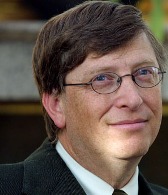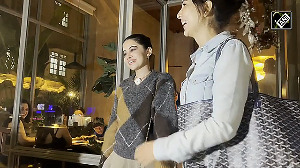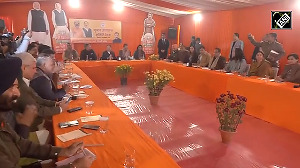 Software czar Bill Gates engaged in a large number of social projects in India, has told US lawmakers that the northern parts of the India face difficult challenges.
Software czar Bill Gates engaged in a large number of social projects in India, has told US lawmakers that the northern parts of the India face difficult challenges.
"We see places like India, where the results are mixed. The north, which has the greatest need, tends to have the most difficult challenges," Gates told members of the powerful Senate Foreign Relations Committee, wherein he testified on "Building on Success: New Directions in Global Health Care", convened by its Chairman John Kerry.
Former US President Bill Clinton, who too is involved in social welfare projects in India and African countries in a big way, also testified before the Committee.
Gates was responding to question about experiences of corruption and accountability in these countries where his Bill and Milinda Gates Foundation is involved in social welfare projects.
In places like India, he said, there are mixed results. "Fortunately, things like vaccines or bed nets are not that attractive for the political elite to stockpile. And so if you can track the grants to the purchase of the commodity and the commodity getting delivered, then you can make quite sure the money's not being diverted. It gets more difficult as you get into personnel systems," he observed.
However, this is difficulty with education, road building, and even health systems to make sure that the work is actually being done, jobs just aren't being given to the politically favoured, as opposed to the people who have the skill sets.
"That is not always executed on very well. You see, we see programmes like in Ethiopia where that's being done well. We see places like India, where the results are mixed," Gates said.
"The answer in many locations is to organise women's groups and to make sure they have the expectation that their kids will be vaccinated, that they will get a bed net. And in a lot of locations, their activism has been key to making sure that nothing is lost between the money being given and the services being delivered," he said.
In the case of vaccination, if people claim they are doing it when they are not, it's easy to go in and do surveillance.
There's also a disease, measles that very quickly shows up; people who claim to have high rates who don't, he said.
Gates said there is always the challenge of which countries to help, the ones that are in the greatest need or the ones that have the best government so that the money will be most effective.
"In Ethiopia, certainly in the health area, they have very effective leadership. And the GHI (Global Health Initiative) proposal talks about some of the ambitious goals they've set for Ethiopia," he said, adding there are some things like vaccinations that can be done even in the worst areas.
"Some of the other things, like training health-care workers and trying to get big improvement there, you want to pick places where you have strong governance, and GHI has this idea of picking countries. They have a challenge with India in particular where you don't want to pick the whole country. You probably want the ability to pick parts of the country," Gates said.








 © 2025 Rediff.com -
© 2025 Rediff.com -